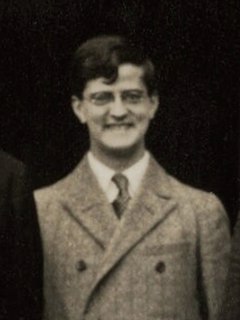
Elizabeth I was Queen of England and Ireland from 17 November 1558 until her death in 1603. Sometimes referred to as the Virgin Queen, Elizabeth was the last of the five monarchs of the House of Tudor.

The Elizabethan era is the epoch in the Tudor period of the history of England during the reign of Queen Elizabeth I (1558–1603). Historians often depict it as the golden age in English history. The symbol of Britannia was first used in 1572, and often thereafter, to mark the Elizabethan age as a renaissance that inspired national pride through classical ideals, international expansion, and naval triumph over Spain.

Alfred Leslie Rowse was a British historian and author, best known for his work on Elizabethan England.
Sir Geoffrey Rudolph Elton was a German-born British political and constitutional historian, specialising in the Tudor period. He taught at Clare College, Cambridge, and was the Regius Professor of Modern History there from 1983 to 1988.

The Tudor period occurred between 1485 and 1603 in England and Wales and includes the Elizabethan period during the reign of Elizabeth I until 1603. The Tudor period coincides with the dynasty of the House of Tudor in England that began with the reign of Henry VII. Historian John Guy (1988) argued that "England was economically healthier, more expansive, and more optimistic under the Tudors" than at any time since the Roman occupation.

Albert Frederick Pollard, FBA was a British historian who specialized in the Tudor period. He was one of the founders of the Historical Association in 1906.
Lawrence Stone was an English historian of early modern Britain, after a start to his career as an art historian of English medieval art. He is noted for his work on the English Civil War and the history of marriage, families and the aristocracy.
Eric William Ives was a British historian who was an expert on the Tudor period, and a university administrator. He was Emeritus Professor of English History at the University of Birmingham.
Muriel Clara Bradbrook (1909–1993), usually cited as M. C. Bradbrook, was a British literary scholar and authority on Shakespeare. She was Professor of English at Cambridge University, and Mistress of Girton College, Cambridge.
John Bennett Black (1883–1964) was a Scottish historian whose primary topic of study was of Elizabethan England. From 1930 to 1953 he was Burnett-Fletcher Professor of History at the University of Aberdeen where a prize is awarded each year in his name.
John Stephen Morrill is a British historian and academic who specialises in the political, religious, social, and cultural history of early-modern Britain from 1500 to 1750, especially the English Civil War. He is best known for his scholarship on Early Modern Politics and his unique county studies approach which he developed at Cambridge. Morrill was educated at Trinity College, Oxford and became a fellow of Selwyn College, Cambridge in 1975.
Sir John Ernest Neale was an English historian who specialised in Elizabethan and Parliamentary history. From 1927 to 1956, he was the Astor Professor of English History at University College London.
Patrick "Pat" Collinson was an English historian, known as a writer on the Elizabethan era, particularly Elizabethan Puritanism. He was emeritus Regius Professor of Modern History, University of Cambridge, having occupied the chair from 1988 to 1996. He once described himself as "an early modernist with a prime interest in the history of England in the sixteenth and seventeenth centuries."
The Creighton Lecture is an annual lecture delivered at King's College, London on a topic in history. The series, which memorializes historian and prelate Mandell Creighton, began in 1907 with a grant of £650, half of which was donated by his widow, Louise Creighton.
Christopher Haigh is a British historian specialising in religion and politics around the English Reformation. Until his retirement in 2009, he was Student and Tutor in Modern History at Christ Church, Oxford and University Lecturer at Oxford University. He was educated at Churchill College, Cambridge and the University of Manchester. Haigh was a very influential revisionist in Tudor historiography and on the English Reformation. Haigh's writings mostly demonstrated that, contrary to orthodox understandings of the English Reformation, religious reform was extremely complex and varied considerably at a parish level. Haigh has also been noted for his work in diminishing the significance attributed to anticlericalism prior to 1530. His revisionism formed part of a broader wave in Tudor historiography with other historians such as Eamon Duffy.
Kevin M. Sharpe was a historian, Director of the Centre for Renaissance and Early Modern Studies, Leverhulme Research Professor and Professor of Renaissance Studies at Queen Mary, University of London. He is best known for his work on the reign of Charles I of England.
Conyers Read was an American historian who specialized in the History of England in the 15th and 16th centuries. A professor of history at the universities of Chicago and Pennsylvania, he was president of the American Historical Association for the year 1949–1950.
Richard Bruce Wernham, was an English historian of Elizabethan England. After his death The Times called him "the leading historian of English foreign policy in the 16th century".

Stanley Thomas Bindoff (1908–1980) was an English historian who specialised in the Tudor and Elizabethan periods. He was the first professor of history at Queen Mary College, University of London. He was the editor of The History of Parliament for the parliaments of 1509-58, published in 1982.
Penry Herbert Williams was a Welsh historian of Elizabethan Britain.